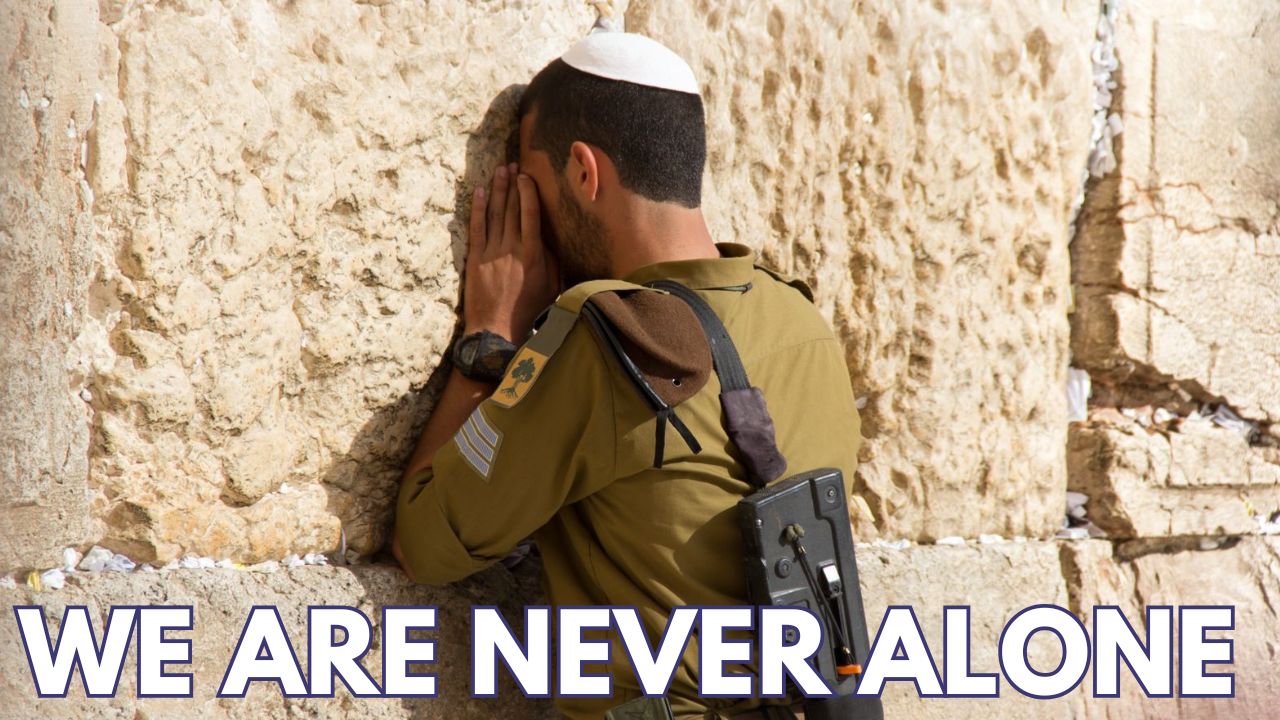WE ARE NEVER ALONE

The rebirth of a Jewish national entity, the State of Israel, in 1948 was no easy feat. It required determination, guile, elbow grease, and above all, the ability of its pioneering creators to straddle two distinct mindsets.
On the one hand, as Chaim Weizmann bluntly put it, “No state was ever founded on air, and no state will ever be maintained on air. We need friends.” On the other hand, David Ben-Gurion nailed it with his famous quip: “In Israel, to be a realist you must believe in miracles.”
In recent times, and especially over the past couple of months, Israel has leaned more and more toward Ben-Gurion’s “miracles” approach — not by choice, but by circumstance. In the wake of October 7, as the Gaza war rages on with no end in sight and the hostages remain trapped in tunnels beneath Gaza, Israel has watched as former friends quietly turned their backs.
For the first time since its founding, the Jewish state may be heading toward a future without allies. Earlier this month, Prime Minister Netanyahu admitted as much, acknowledging that “Israel is in a sort of isolation,” and insisting the nation must transform itself into a self-reliant “super Sparta,” with an economy of “autarkic characteristics.”
In an article this week, the Financial Times put the question very starkly. The headline reads: Can Israel go it alone? In the early years of Zionism, and in the period immediately after Israel was founded, the question would have seemed utterly absurd. The secular Zionists who built Israel were desperate for allies, and for good reason. Without the backing of sympathetic powers, the Jewish state would never have gotten off the ground, nor would it have survived its earliest years.
Chaim Weizmann’s tireless diplomacy produced the Balfour Declaration in 1917. Ben-Gurion’s delicate balancing act between Washington and Moscow, as well as London and Paris, during the first decade of the state secured the legitimacy and the weapons Israel needed to win its War of Independence and to establish itself as a haven for Jewish refugees, whether survivors of the Holocaust or those fleeing persecution in Muslim lands.
For the many decades that followed, every war Israel fought was as much about airlifts, arms shipments, and foreign support as it was about battlefields in Sinai, Judea, Samaria, Lebanon, or the Golan.
But the FT’s question, as jarring as it is, could not be timelier. Since Hamas’s barbaric rampage of October 7, 2023, Israel has taken the gloves off, pursuing its enemies across multiple borders and with unprecedented force.
Beyond Gaza, five countries have felt Israeli firepower in the past year — Lebanon, Syria, Yemen, Iran, and, most recently, Qatar. Meanwhile, the war in Gaza grinds on, seemingly without end. Inevitably, Israel’s international allies — such as they were ever truly allies — have been alienated.
Even America, Israel’s most consistent friend, is starting to look shaky. A Gallup survey in March revealed only 46% of Americans now back Israel, the lowest figure in a quarter-century of polling.
Yet today’s Israel seems increasingly comfortable giving the world the cold shoulder. Netanyahu is fully aware of Israel’s emerging status as an international pariah, but it has not halted his harsh stance and belligerent military campaign.
“No one likes us, we don’t care” — the football chant made famous by supporters of London’s Millwall FC soccer team in the late 1970s — now appears to be shaping Israeli foreign policy. Without the friends cited by Weizmann, Israel will need to rely on the miracles evoked by Ben-Gurion.
So what is the answer to the FT’s question? Can Israel go it alone? Parshat Vayeilech offers a striking perspective. Moshe, standing at the end of his life, tells the nation that although he will no longer be with them, they must not be afraid of the enemies they will soon face (Deut. 31:6): חִזְקוּ וְאִמְצוּ אַל־תִּירְאוּ וְאַל־תַּעַרְצוּ מִפְּנֵיהֶם כִּי ה׳ אֱלֹקֶיךָ הוּא הַהֹלֵךְ עִמָּךְ – “Be strong and courageous, do not fear them, for Hashem your God, He is the One who goes with you.”
In other words, even without Moshe, even when all might seem lost and hopeless, Israel will never be alone. God Himself will be their ally, their protector, and their guarantee.
This same message reverberates in Tishrei, the month of awe and renewal. On Rosh Hashanah, we crown God as King; on Yom Kippur, we reaffirm His forgiveness and mercy; and on Sukkot, we remind ourselves that our true shelter is not fortresses or man-made protections, but the divine presence.
At precisely the moment we feel most vulnerable, we are reminded that our survival has never depended on external powers, but on God’s steadfast devotion to His people. Israel can go it alone — because we are never truly alone.
Rabbi Avraham Yitzchak HaKohen Kook (1865-1935), whose rabbinic career coincided with the emergence of the Zionist movement and who embodied the passion for the Jewish return to the Land of Israel, expressed this timeless truth with his usual brilliance. “The people of Israel live and endure forever,” he wrote, “because God is in their midst, and the Shekhinah never abandons His people” (Orot Yisrael 2).
Elsewhere, he emphasized: “The Shekhinah descended with Israel into the exile and dwelt among them, and suffered as they suffered” (Orot Yisrael 6:1). For Rav Kook, the enduring presence of God alongside His people — even in the darkest times — is the ultimate guarantee of Israel’s survival.
Chaim Weizmann was right: no state can survive on air, and friends are important. But David Ben-Gurion was also right: in Israel, realism requires belief in miracles — particularly, the miracle of God Himself standing behind our continued presence in His land, our land.
The truth is, Israel has always lived in the tension between those two poles. Allies matter, diplomacy matters, and strategic alliances matter — but none of these explains how Israel has survived against all odds, nor why the Jewish people are still here when so many ancient and far more powerful nations have long since disappeared into the dustbin of history.
The Financial Times asks if Israel can go it alone, as though the answer lies only in geopolitics and public opinion. But Vayeilech and the High Holy Days remind us that the answer lies elsewhere. We can endure isolation and survive the loss of allies because our destiny has never depended solely on human support. It has always rested on our covenant with God.
Rav Kook’s words echo across the century since he first wrote them: Israel does not endure because of external forces, but because the light of God lives within it.
So yes — Israel can go it alone. Not because of superior weaponry, not because of economic resilience, not even because of national grit – although all of those things are undoubtedly part of the mix – but because the God of history walks with us.
The Jewish people’s alliance with God is the greatest alliance any nation could ever hope for, and it is unbreakable. In the end, it is not isolation that defines Israel’s future, but faith. And faith assures us that the Jewish people, and the State of Israel, will never truly be alone.

